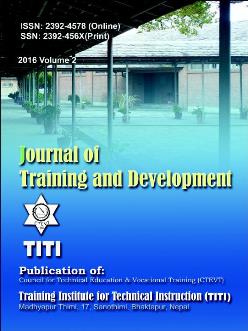Role of Technical and Vocational Education and Training in Women Empowerment: A Case from Bima VDC of Myagdi District, Nepal
DOI:
https://doi.org/10.3126/jtd.v2i0.15436Keywords:
Technical education, vocational training, women empowerment, social development and economic developmentAbstract
This study analyzed role of technical & vocational education and training in women empowerment process specifically in local level. In fact, technical & vocational education and training programs not only provide self-employment opportunity to the women but also trigger capability to exercise control over their personal and family life, make choices to improve well beings and take active role in decision making. For justifying central argument; what are the changing role of technical & vocational education and training that has been fostering women empowerment as well as social and economic development process in this VDC (Village Development Committee), the researchers employed quantitative case study research design and applied key informant interview, observation and household survey as data collection techniques. Researchers purposively selected 63 sample populations (10 respondents who completed technical & vocational education and 53 respondents who participated in vocational skill development trainings). The study found significant role of technical & vocational education and training that have been transforming women empowerment and social and economic development process in local level. More so, for promoting social and economic development process, capable and skilled women are equally playing; decision making, leadership, educational and change agent role in the VDC. The study concluded that technical & vocational education and training program conducting in local level help to nourish knowledge, ability and develop vocational skills of women and empowering them. Similarly, empowered women are also playing transformative role in social and economic development process of the VDC. Finally the ideas in which vocational education and training found to be means and ends for women empowerment in this VDC can be replicate in other similar settings.
Downloads
Downloads
Published
How to Cite
Issue
Section
License
Authors who publish with this journal agree to the following terms:
- Authors retain copyright and grant the journal right of first publication with the work simultaneously licensed under a Creative Commons Attribution License that allows others to share the work with an acknowledgement of the work's authorship and initial publication in this journal.
- Authors are able to enter into separate, additional contractual arrangements for the non-exclusive distribution of the journal's published version of the work (e.g., post it to an institutional repository or publish it in a book), with an acknowledgement of its initial publication in this journal.
- Authors are permitted and encouraged to post their work online (e.g., in institutional repositories or on their website) prior to and during the submission process, as it can lead to productive exchanges, as well as earlier and greater citation of published work (See The Effect of Open Access).




